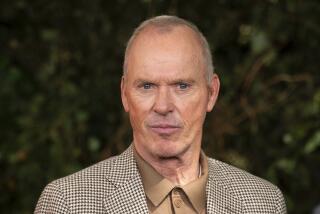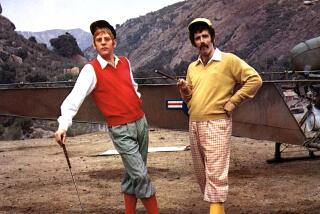Life catches up to Michael Douglas
Reporting from New York City — Just two weeks into a scheduled two months of daily radiation for Stage 4 throat cancer, Michael Douglas sits in his darkened living room. The treetops of Central Park are just visible through a crack in the drawn curtains, and in the shadowy afternoon light, Douglas appears his always-handsome self. But he sips frequently from an aloe drink to soothe the sores in his mouth, and when he speaks, it is as if he is addressing a dozing child, gently turning the words over in his mouth for maximum effect without projecting. Clearly, he is in pain.
This was supposed to be a victory lap. Douglas has returned with gusto to his Oscar-winning role as Gordon Gekko in Oliver Stone’s “Wall Street” sequel, “Money Never Sleeps,” and received good reviews for his performance in the indie film “Solitary Man,” which was released this summer and has just come out on DVD. Instead, Douglas is putting on a show of bravery, pressing on with his professional obligations while matter-of-factly explaining that only two weeks from now, he probably won’t be able to eat or to speak.
“Do you really want to have this conversation?” he asks apologetically when asked about the progression of treatment. “The radiation kills the cancer, but it kills everything else too,” he explains, “the white blood cells, the red blood cells. Sores start forming in your mouth, then lesions, and then you can’t swallow. People then either get fed through their stomach or you fight it and go through it by drinking liquids.” Not surprisingly, the actor — who turns 66 this week — says, “I’ve decided to fight it. If you do the stomach thing, it’s a lot of weeks of not swallowing and then you have to learn how all over again. Right now, I have days where I can do a little bit and days I can’t. What I’ll really be struggling with the last few weeks is the weight loss, because you can’t eat solids and you really can’t swallow.”
In an age of reality stars and actors obliging their audience with endless Twitter posts, Douglas is a sober reminder of the dignity that can still accompany fame: While he admits it might be nice to be battling the cancer in private with his wife, Catherine Zeta-Jones, and their two children by his side, it’s not an option. “I reside in New York and I’m in the public eye,” he says matter of factly.
Especially public now with the opening of “Wall Street: Money Never Sleeps,” which features a more ambivalent Gekko, a man who has suffered in the intervening years he has been in prison. The film costars Shia LaBeouf as an up-and-coming financier engaged to Gekko’s estranged daughter ( Carey Mulligan), as well as Susan Sarandon, Eli Wallach and Frank Langella. It wasn’t a difficult part to say yes to: Douglas is the first to credit 1987’s “Wall Street” with helping make him a box office commodity, following on the heels of that year’s “Fatal Attraction,” in which he was memorably stalked by bunny-boiling Glenn Close. “Before that, I had the producing thing going,” says Douglas, who lent his behind-the-camera expertise to such films as 1975’s “One Flew Over the Cuckoo’s Nest” and 1979’s “The China Syndrome.” “But I couldn’t get myself cast in a part. When I did [1984’s] ‘Romancing the Stone,’ people were saying, ‘Why would you want to be an actor if you could produce?’ But it was fun.”
That’s not a word Douglas chooses to describe reuniting with Stone, who is renowned for his laser-sharp focus and whatever-it-takes attitude. “Oliver is a very good listener, but he sometimes lacks joy,” Douglas says with a laugh. “I’d never say it’s fun with him. But it’s exciting to get good work. I’m very fond of Oliver, I really am,” he continues, “and we get on, but I do think there may be an easier way to do things.”
Douglas’ work ethic is as strong as it ever has been, witnessed by his star turn in “Solitary Man,” which was shot in 26 days. Written and directed by Brian Koppelman and David Levien, Douglas plays a car dealer in the film who alienates his family — Sarandon plays his ex-wife — and it is, at least on the surface, a sober piece about a man coming to the end of his life without a moral center. But Douglas says he found the levity in the piece. “I thought it was hilarious, in the same way that I try to find the humor in the cancer,” he says. “I thought he was a wonderfully outrageous character, and the joy of doing indies is you can simply satisfy yourself. This movie just appeals to that really dark side of me that has a chuckle, not a cry.”
Stone says it is precisely Douglas’ darker side that made him eager to recast him as Gekko. “He’s a much more interesting character now,” the director says. “In the original ‘Wall Street,’ Michael brought surprise because no one saw him as an actor of that weight at the time. But now, Michael has lived life. He’s always had a side of him that’s dark, but back then he had a more golden life in a lot of ways. Now, the rubber has met the road. Life catches up with everyone, and Michael has the gift of being able to project that.”
For the moment, Douglas says he is walking the line between focusing on spending time with friends and family during his treatment and looking forward to his next projects. “We’re going to do Liberace,” he says of the long-planned biopic, “and people say, ‘Why are you going to do that?’ And I say, ‘I have no idea.’ It’s the risk factor and knowing there’s a solid story there,” he says confidently. “But what I really always like and am drawn to,” he adds with a smile, “is the unpredictable.”
More to Read
Only good movies
Get the Indie Focus newsletter, Mark Olsen's weekly guide to the world of cinema.
You may occasionally receive promotional content from the Los Angeles Times.








